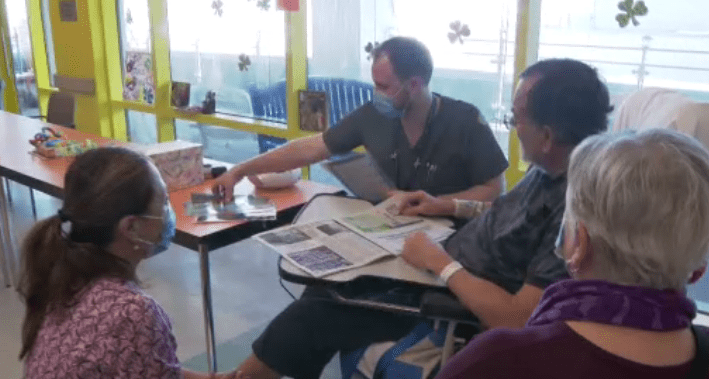World first for Brampton, Ont. hospital acute care unit for dementia patients | Globalnews.ca
The transformation inside the Acute Care for the Elderly (ACE) unit at Brampton Civic Hospital is striking.
The walls are splashed with vibrant colours, while the doors to patients’ rooms are sheathed in decals that mimic the appearance of wooden doors and juliet balconies.
Last month, the William Osler Health System was accredited as the first acute care health system in the world to implement the The Butterfly Approach in a hospital setting.
Read more:
University of Calgary researchers to look at aging brain as study says vitamin D prevents dementia
The emotion-based, person-centred model of care for dementia patients was developed by U.K.-based consultancy Meaningful Care Matters, and has since been implemented in several long-term care homes there, as well as Australia and Canada.
“The details are everything,” said Patricia Geerlinks, the director of women’s, children’s and seniors’ programming. “A person who cannot cognitively recall because their memory is declining recalls on their emotional brain.”
The wall decals include nursery rhymes, landscape murals, household appliances and bookshelves. There are also interactive stations and games.
Patients who are admitted to the unit also include those requiring care for delirium.
Geerlinks herself has been working with Meaningful Care Matters for a number of years to develop the blueprint to adapt the Butterfly Approach for an acute-care hospital setting.
“A person living with dementia sees colour five times lighter than anybody else, so shades of beige…is all white for them,” Geerlinks explained.
The colourful walls allow patients to essentially grasp where they are going, she added.
Read more:
Bruce Willis’ wife pleads with paparazzi to ‘give him space’ amid dementia struggle
Dr. Sudip Saha is the medical director of seniors health and division head of geriatric medicine. He was instrumental in the implementation of The Butterfly Approach at Malton Village long-term care centre in 2017.
“Dementia is one of the biggest health care challenges of our time and in the absence of any curative or disease-modifying treatment, we need to think of other ways that we can best help these patients,” he told Global News.
According to a report released by the Alzheimer Society in September 2022, more than 600,000 people are living with dementia.
© 2023 Global News, a division of Corus Entertainment Inc.
For all the latest health News Click Here




